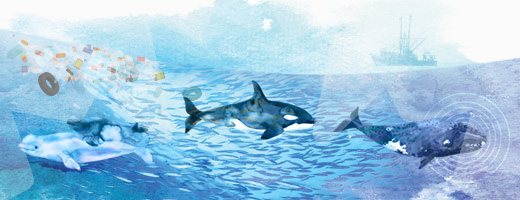Research to support the protection of whales in Canadian waters
The Government of Canada is committed to taking actions to protect marine mammal populations, in particular the Southern Resident Killer Whales, the North Atlantic Right Whales, and the St. Lawrence Estuary Belugas. Scientific research helps us better understand the threats facing these iconic species and informs so we can better protect them.
Whales Initiative
Whales Initiative
Investments in scientific research under the Whales Initiative are an important part to protecting and supporting the recovery of endangered whale populations across Canada. A number of actions will further increase our knowledge about the locations, movement and abundance of whales in Canada, as well as their food sources and factors threatening their health. These include:
- Expanding the use of existing technologies and approaches to monitor and track whales in Canadian waters as well as developing, testing, and implementing new ones.
- Increasing research on contaminants and studying their impacts on these whales. This will include monitoring contaminant levels in whales and in their main prey.
- Expanding monitoring and tracking systems for whales to inform vessel slowdown measures and to support fisheries management measures.
- Assessing other measures for marine mammal avoidance such as modifications in fisheries, seasons or locations.
- Expanding research activities to better understand prey availability and whale foraging success.
Oceans Protection Plan
Oceans Protection Plan
Through the Oceans Protection Plan, the Government of Canada has already taken action to protect endangered whale populations across Canada. The government has provided funding for a number of initiatives that support the protection and recovery of endangered whales, including:
Scientific Reviews
Scientific Reviews
Fisheries and Oceans Canada has completed science-based reviews of the effectiveness of protection and recovery actions in place for all three whales:
- Review of the Effectiveness of Recovery Measures for Southern Resident Killer Whales
- Review of the Effectiveness of Recovery Activities for North Atlantic right whales
- Review of the Effectiveness of Recovery Measures for St. Lawrence Estuary Beluga
In addition, the department’s Canadian Science Advisory Secretariat (CSAS) conducts peer review processes to address a number of scientific questions related to the management of Canadian oceans and the conservation of marine and freshwater resources. Since 2017, CSAS has published a number of reports related to whales:
- Science Advice on Timing of the Mandatory Slow-down Zone for Shipping Traffic in the Gulf of St. Lawrence to Protect the North Atlantic Right Whale
- Evaluation of the Scientific Evidence to Inform the Probability of Effectiveness of Mitigation Measures in Reducing Shipping-Related Noise Levels Received by Southern Resident Killer Whales
- Assessing the risk of ship strikes to humpback (Megaptera novaeangliae) and fin (Balaenoptera physalus) whales off the west coast of Vancouver Island, Canada
- Habitats of Special Importance to Resident Killer Whales (Orcinus orca) off the West Coast of Canada
- Identification of habitats important to the blue whale in the western North Atlantic
- An update of beluga (Delphinapterus leucas) abundance and reported deaths in the St. Lawrence River Estuary
- Ecosystem Research Initiative (ERI): Integrated Advice on the Summer Habitat of the St. Lawrence Estuary Beluga (Delphinapterus leucas)
Whale Science for Tomorrow
Whale Science for Tomorrow

The Whale Science for Tomorrow initiative was established to provide funding to Canadian universities for research on endangered whales in Canadian waters. The joint collaboration between Fisheries and Oceans Canada (DFO) and the Natural Sciences and Engineering Research Council of Canada (NSERC) supports research that will aid the recovery of the Southern Resident Killer Whales, North Atlantic Right Whales, and St. Lawrence Estuary Belugas.
The initiative aims to encourage collaboration and innovation by providing funding for large-scale, university-based whale research projects focused on the health of these whales and the stressors affecting them. The results from the selected projects will ensure decision-makers have the latest information necessary when deciding the best protection and conservation efforts related to these priority whale species.
A volunteer evaluation committee of representatives from academic and non-academic institutions selected 3 research projects. Each of these projects will receive investments under the Whale Science for Tomorrow initiative.
- Date modified: